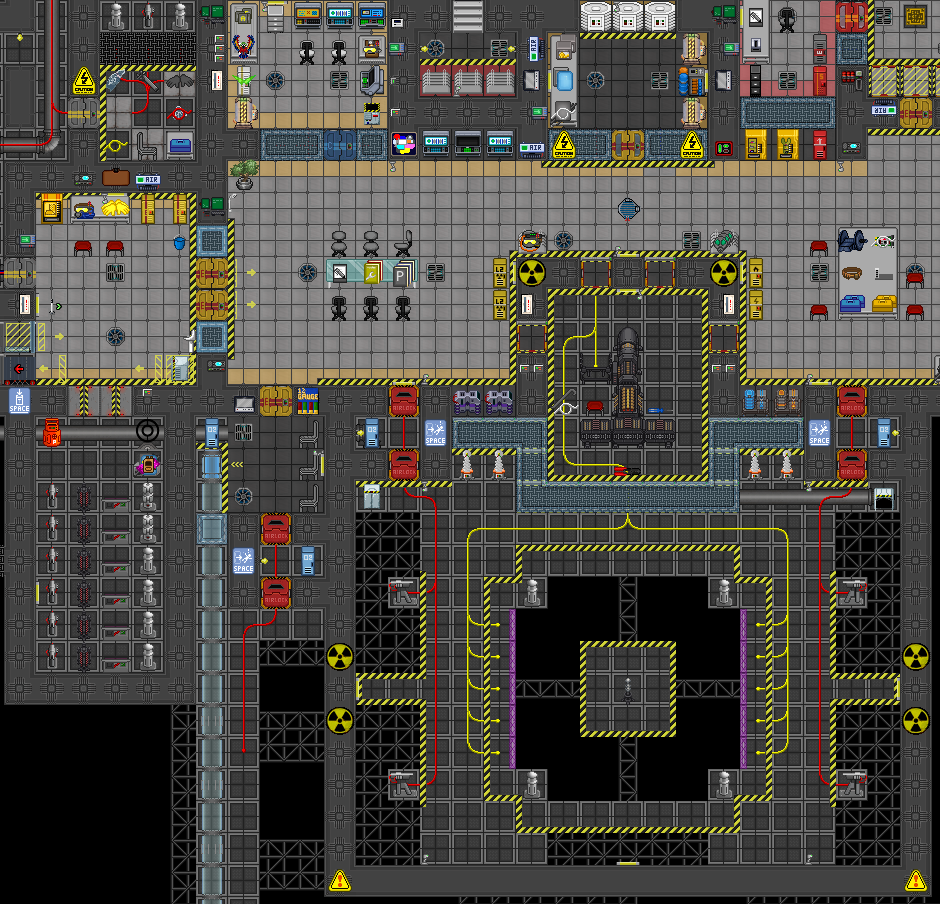Смотрите ПР - здесь.
The Singularity and Tesla engine follow the same principle:
A Particle Accelerator feeds them energy; in return they emit radiation or tesla arcs. If their containment fails, everybody is in for a bad time.
How to set them up:
It's really not that hard to set up both engines properly unless you've had a bad run in with retardation. This guide will assume that you're doing it alone, whether because you're the only engineer that signed up, or because everyone else buggered off like they always do.
The engine is housed inside the station, just south of where you begin off at round start. You'll need some tools to set it up, all of which you can conveniently acquire right in Engineering.
You will need:
 Hardsuit.
Hardsuit.
 Set of internals.
Set of internals. Wrench.
Wrench. Screwdriver.
Screwdriver. Wirecutters.
Wirecutters. A cable coil.
A cable coil.
Tesla only:
 Insulated Gloves, because the Tesla is a giant spinning ball of electricity.
Insulated Gloves, because the Tesla is a giant spinning ball of electricity.
Singularity only:
 6 Plasma Tanks. You can obtain them from the dispenser next to the power monitoring terminal or from Atmospherics.
6 Plasma Tanks. You can obtain them from the dispenser next to the power monitoring terminal or from Atmospherics. Optical Meson Scanner or Engineering Scanner Goggles, this is to protect you from getting stunned if you look at the active singularity.
Optical Meson Scanner or Engineering Scanner Goggles, this is to protect you from getting stunned if you look at the active singularity.
Now that you have your supplies, it's time to get to work! Note that the steps below can be done in any order as you like, as long as you turn the Particle Accelerator on last.
WHAT TO DO:
Arrived late and SMES have already lost power? Go to In Case of No Power.
Inside Engineering:
1. Choose between Tesla and Singularity
In general, the Tesla engine requires no babysitting but will quickly destroy most of the station if it breaks containment. It generates electric arcs that make machinery explode.
The Singularity engine requires a little more time to set up but moves in a slow, predictable path. It creates radiation, EMPs and may stun people that look at it without proper eyewear.
Outside Engineering (Spaceproof Equipment Required):
2.A The Tesla engine
Tesla Coils capture power from electric arcs, while the Grounding Rods make sure you (and machinery) don't get fried by arcs.
2.A.1 Installing Tesla coils
Move all Tesla coils out of secure storage into the engine chamber, then wrench them down on top of the yellow wire knots.
2.A.2 Moving grounding rods
Unwrench the four grounding rods and wrench them down near each of the Field Generators. This will keep stray arcs from zapping nearby machinery and people.
When you're done, go to step 3.
2.B The Singularity engine
When they're loaded with plasma tanks, rad collectors convert radiation into power. Plasma inside them slowly gets converted into tritium.
2.B.1 Replacing the energy ball generator
Important: Remove the energy ball generator from the engine chamber and replace it with the gravitational singularity generator from secure storage!
2.B.2 Installing rad collectors
Move all rad collectors out of secure storage into the engine chamber, then wrench them down on top of the yellow wire knots.
2.B.3 Fueling and activating rad collectors
Plasma Tanks may be found in the Tank Storage Unit in the Power Storage Room or in Atmospherics' Office. Place one Plasma Tank in each collector array and then TURN THE ARRAYS ON BY CLICKING ON THEM with an empty hand. Do this for all six collectors, and you should be ready to continue. If you wish, you can top off the plasma tanks. This doesn't increase power generation, but lets rad collectors run longer. Note that the usual amount of plasma that starts in a plasma tank is more than enough for multi-hour shifts.
You may also lock each Radiation Collector with your ID so that the AI cannot deactivate them remotely (which you won't notice with the radiation shutters down).
3. Start the Emitters
Now that you've gotten everything ready, it's time to start the engine! Run around the engine chamber and turn on the emitters by clicking on them.
3.1. Lock the Emitters (Optional)
It is highly recommended to lock each of the emitters by swiping your ID on them, after activating them. This will stop an AI, or anyone without Power-management access from deactivating the emitters.
4. Start the Field Generators
![]() Now that the emitters are on, it's time to fire up the field generators.
Now that the emitters are on, it's time to fire up the field generators.
Make sure to stay on the outside of the field generators and activate them as you move in a circle through the area.
Coming into contact with any of the field generator beams will knock you down for a LONG time. This is especially bad when a singularity pulls you into the beam over and over!
Back inside Engineering:
5. Set up the Particle Accelerator
Now it's time to set up the Particle Accelerator itself. First, wrench each piece in place. Second, wire all the pieces with a cable coil. Finally, use a screwdriver to close all the panels. Click on the console and hit "Scan for parts" to link the console with the actual PA. This is your Particle Accelerator set up!
If the parts have been moved, rearrange and rotate them until they look like the picture above. Make sure that the PA computer has a powered wire underneath!
5.1 (Optional) Hack the Particle Accelerator (Optional)
Hack the PA, and cut the limit wire. This allows you to set the PA to a power of 3. Absolutely recommended for Tesla engines, since giving them more power doesn't increase the risk of containment breach.
You can also do this if you want to quickly boot up a singularity - just remember to keep a close eye on it.
6. Fire it up!
Double check that field generator beams form a box around the central chamber, get back inside the station and head to the Particle Accelerator..
The Particle Accelerator is used to feed the Tesla/singularity and make it grow, which results in more energy.
6.A Tesla
Move over to the Particle Accelerator Control Box and set the output to 2 (or 3 if you hacked the PA). You can leave the PA at its max settings permanently without any ill effect.
The energy ball doesn't generate any radiation, so you don't even have to close the shutters.
6.B Singularity
Don a Radiation Suit (although a Hardsuit works too) and some Optical Meson Scanners or Engineering goggles. Singularities emit radiation and can knock you down if you look at them without protection,
Set the output to 2 (or 3 if you hacked the PA). Leave it this way until the singularity fills a 3x3 area (Stage 3, turning a pink color) - though if you want to play it safe you can and let it fill a 2x2 area (Stage 2, turning a red color). This should be more than enough to fill the station's power needs. When the singularity reaches this stage, set the Particle Accelerator output to 0 but DO NOT TURN IT OFF.
This will sustain the singularity's current size without causing it to turn into a supermassive black hole.
7. Activate the SMES Cells
There are three SMESes located in the room at the northern end of Engineering.
Make sure each of the SMESes are set to auto charge, and have the input charge slightly higher than the output. A input/output charge of 200,000/140,000 each will charge the SMES extremely quickly, and ensure the station will always have enough power fed to it.
If you want, watch them for a few minutes to make sure they continue charging. If one or all stops (the light will turn red instead of blinking yellow) adjust one or all a bit to make sure they're not trying to charge faster than the power input to them allows.
8. Maintenance
A loose tesla/singulo is the most probable reason for a shuttle call, so you have a BIG responsibility of keeping the whole crew safe!
The Tesla is very low maintenance. All you really have to do is to check that the emitters are still powering the shield generators. Even a greyshit fiddling with the PA controls won't endanger the containment of the Tesla.
The Singularity however should be checked on every 15 or so minutes - make sure that it still has the right size and that containment is fine. On very, very long shift you might have to replace empty plasma tanks as well.
In Case of No Power
No engineers or only lazy bastard engineers and none of them set up the engine? Fear not, follow these steps and you'll see how easy it is to jump-start the engine even with 0 W power in the network.
- Set up the PA and either tesla coils/grounding rods or rad collectors/singularity generator.
- Switch off input for all SMES.
- Find the P.A.C.M.A.N.-Type Portable Generator inside Engineering.
- Install the PACMAN on an exposed wire in engineering connected to the powernet, load it with plasma sheets (found in the Engineering Secure Storage) and switch it on.
- Switch the emitters on and they should now start firing! Switch the field generators on while you're out there, too.
- Load a new full power cell to the Engineering APC so the PA gets power (set equipment on and everything else off to preserve power for now).
- Switch the PA on and you're winner!
- Once the engine is contained and running, switch SMES input back on.
More on the Tesla
Energy Balls
This big floaty ball of pure electricity can only be contained by the containment field. When you shoot the energy ball with the Particle Accelerator, it gains energy like a singularity, but when it hits 300 energy, it generates a mini-energy ball that orbits the big energy ball. This will send off an extra shock when the energy ball pulses, and this can happen as many times as you let it. The energy ball will also naturally generate small amounts of energy, so eventually a second ball will form.
Be warned, the more mini-balls the energy ball has, the more shocks it sends out at once, and the further it can travel each move. A good engineer can use this to generate lots of power, and a bad one can abuse this to murder the entire station.
An energy ball will shoot bolts of electricity off at conductors, which it prioritizes in this order:
- Tesla coils
- Grounding Rods
- Mobs (this means you)
- Machines (they will explode!)
It will also strike the closest distance-wise of the list after it goes through these criteria.
Modding and upgrading
If you use a screwdriver on a tesla coil's board, you switch it to research mode. Instead of generating power, it now generates research points. Very useful if you coordinate it with RnD!
You can upgrade tesla coils' capacitors as well to increase power/research point generation.
TESLOOSE
If the Energy Ball is to get out of containment somehow, it will pass through walls, windows, anything. It will shoot electricity at conductors, mobs, etc, and direct bolts from the Energy Ball will instantly kill a spaceman; you can protect yourself partially with either insulated gloves or a hardsuit, while wearing both will make you immune to electric bolts.
Hiding inside lockers and crates will also protect you from electric arcs. Keep in mind that the energy ball can still blow a machine next to you and depressurize the whole room.
Being hit by the ball itself will turn you into a pile of dust regardless of protection. Any piece of electronics, such as consoles, machines, or airlocks, will violently explode when hit, causing vast damage to the station.
The Energy Ball usually moves towards the last direction it shocked, which means that it will actively seek areas with more machines and conductive materials.
More on the Singulo
The Singularity, Itself
The Singularity moves in a random direction while occasionally releasing EMPs and stunning people who look at it without Meson/Engineering scanner goggles.
Its size is determined by the amount of energy "points", which decrease on their own and are increased when it consumes PA particles or solid objects.
What Lord Singuloth really hungers for, however, is engineering staff. For example, when Engineers or the Chief Engineer are consumed by the Singularity, they add 100 "points," compared to say, 20 "points" for regular humans.
The Clown, when thrown into the singularity, has a random chance of taking away or giving 1000 points. Throwing the clown into the Singularity is a valid survival tactic. Mull on that.
Stages
Once the Singulary hits a certain amount of energy "points", it will increase or decrease by a stage.
This influences its size, gravitational pull range and radiation output.
Protip: Throwing a Bag of Holding into a Singularity will cause a big explosion and decrease its stage!
Stage 1
- Points: 1 - 199
- Gravitational Pull: 4
Starting size for a Singularity.
Stage 2
- Points: 200 - 499
- Gravitational Pull: 6
Usually sufficient to power a small station without any major issues arising.
Stage 3
- Points: 500 - 999
- Gravitational Pull: 8
Provides enough power for a Metastation/Boxstation sized map. Make sure you know what you're doing if you go past stage 3.
Stage 4
- Points: 1000 - 1999
- Gravitational Pull: 10
Very risky, but theoretically containable.
It's """theoretically""" containable in that it's theoretically possible to play a year on Vorestation and not be a degenerate.
Stage 4 won't unanchor structures, but will pull with such force that it will destroy machinery and even tear down r-walls. Not recommended.
Stage 5
- Points: >2000
- Gravitational Pull: 10
A Stage 5 Singularity will rip out wrenched objects and destroy shield generators, creating a guaranteed release of the Singularity.
Stage 6
- Points: >3000, and has to have consumed a Supermatter Shard
- Gravitational Pull: 15
OH GOD CARGO JUST THREW A SUPERMATTER SHARD INTO THE SINGULARITY RUN
THIS ALSO SETS PEOPLE ON FUCKING FIRE
Turning off the Engine
Occasionally, bad stuff happens. In fact, most of the time, bad stuff happens. Sometimes it is necessary to deactivate the engine as safely as possible because nobody can maintain it. Other times meteor showers and bombs endanger your containment machinery. Whatever the crisis, if you have followed the steps above it should be safe to simply turn the accelerator off. The engine will continue to generate power as the singularity starves and shrinks, so containment SHOULDN'T fail until the singularity is sufficiently small enough that it cannot move and pull stuff into it. However, the 1x1 baby singularity will take a long time to die completely, leaving it exposed to potential suicidals jumping into it, giving the singularity energy to expand again. (Cool fact: Engineers provide a singularity with a lot more energy than you'd expect).
Sometimes it's a good idea to charge the SMES quickly (using the optional techniques above) and then turn off the engine safely until you need power again.
If things have absolutely gone tits up, there's a rumor that the singularity will reduce in size by a few stages if it swallows a Bag of Holding. A full sized rampaging singularity would have to swallow two or more to be completely defeated.
And if things are really bad, you could always try sacrificing the Clown to it in a sacrificial ritual style event. This can either decrease the singularity size by a stage or two... or increase it by one or two stages. Your call. The clown will probably find their way into it without you doing anything anyways.
Lord Singuloth Craves Freedom
The singularity is -- along with massive plasma infernos and large scale bombings -- one of the most brutal forces on the station. Dangerous enough when set free, it becomes a lag-inducing, shuttle-calling, indiscriminately murdering monstrosity when given a directed path by a Singularity Beacon, leaving nothing but debris, body parts and cold hard vacuum in its path. Perhaps the most dramatic way to end a round as a traitor, it can even eat the emergency shuttle itself, restricting escape to those few smart or lucky enough to grab EVA gear. It's a very effective weapon to use against assassination targets who commonly spend a lot of time in one area, such as scientists or even the AI.
Setting the singularity free is not the easiest task to complete as a regular crew traitor, and you will get robusted in short order if you are caught. Generally speaking, all you need to do is disable the singularity containment field. This can be accomplished by deactivating the emitters, which is hazardous due to the gravitational pull of the singularity, its radiation, and the hazards of the containment system itself. Alternatively, you can disable the engineering APC. If you are not an engineer and get identified doing this, you can expect to not make it onto the emergency shuttle alive. Another option is deactivating the collectors, as the Engineering APC cannot charge from the SMES -- this form of sabotage probably won't be noticed and will likely be blamed on engineer incompetence.
The easiest way to release the singularity is accessing the engine control console and turning power up to level 2 or hacking it to 3. Keep in mind that the containment field is designed to tolerate short term power outages, so if anyone notices the power failure before the containment field fails, then your attempt will be thwarted. A way to free the singularity without the AI being able to stop you is to go outside and unwrench and unweld the emitters. Doing so will result in them promptly getting sucked into the singularity themselves, and the containment field falling shortly afterword, this method is very dangerous however. A more expedient way of doing so is cutting the power wires leading to the emitters. Protip: Try turning the PA up to 2 for a while until the Singularity gets huge, then turn off the collectors after a few minutes. If the Engineering staff hasn't wired the Singularity straight into the system, it should fail extremely fast and you'll have a 5x5 singularity eating the station faster then Gabe Newell pounces on a Big Mac. Be careful to not get caught in the pull, though.
Directing the singularity to a target area - be it the emergency shuttle bay or the bridge - requires a singularity beacon and a screwdriver. Don't hang around after you plant it, unless you are in the mood to change classes. Putting the beacon somewhere outside the station is usually your best bet to ensuring the singularity reaches its destination, but this will require either a PACMAN generator or a very obvious cable leading to it.








